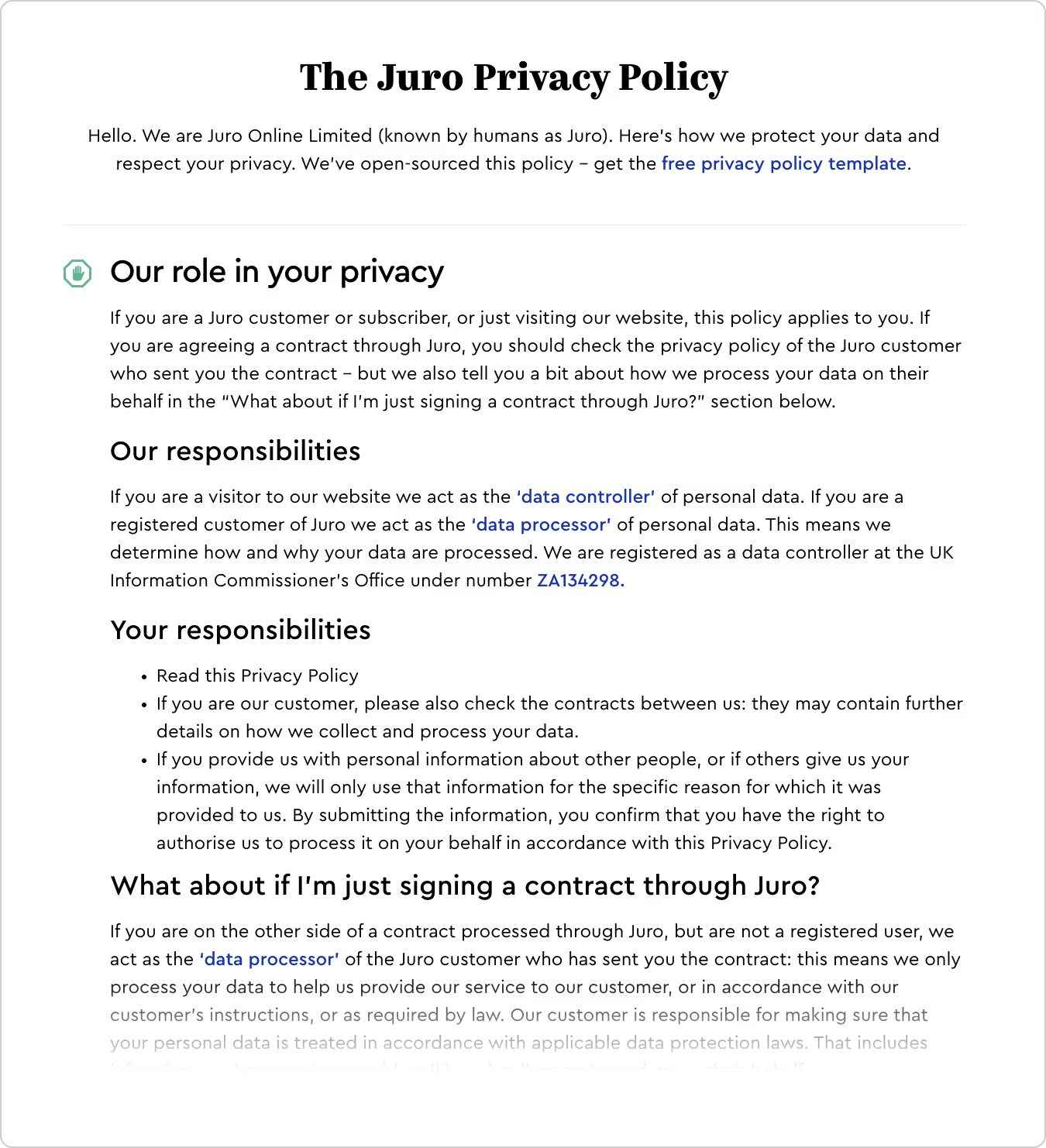Solutions
Customer Support
Resources
Almost every business that uses technology in some form needs a privacy policy. Grab our free template to get a beautifully designed privacy policy anyone can read.
This privacy policy was designed by renowned information designer Stefania Passera and its design patterns are part of World CC's contract design patterns library.

This privacy policy was designed by renowned information designer Stefania Passera and its design patterns are part of World CC's contract design patterns library.



A Privacy Policy is a legal agreement between website owners and website visitors that provides visibility about how visitors’ personal information is collected, used, and protected.
Almost every time you visit a website, you’re prompted to share personal information with that website. This could be for marketing purposes, or it could be essential to providing some sort of service you’re requesting. Either way, you’ll likely be disclosing your personal data, and a Privacy Policy sets out some rules to regulate this data-sharing relationship and protect your interests.
To be specific, a Privacy Policy will disclose any relevant details about:
It sounds confusing, we know. But that’s exactly why creating more readable, accessible and user-friendly Privacy Policies has never been more important. After all, we all deserve to know when our personal data is used and what’s being done with it.

Privacy Policies are a legal requirement for websites that collect, store, process, or manage any personal information about site visitors. This means that, if you own a website that gathers individuals’ personal data, you need to have a Privacy Policy in place.
In fact, even if your business isn’t collecting personal data intentionally, it’s still important to have a Privacy Policy in place. Given how websites function, it’s rare for them not to collect some personal information.
Every time a website user submits a customer inquiry, subscribes to a mailing list, or consents to cookies for advertising, they’re passing on their personal information. A Privacy Policy is needed to clarify what happens next with this information.
In many jurisdictions, a Privacy Policy will be required by law for websites processing personal data. What these laws look like and cover, however, typically varies from country to country. Here are a few examples of how that works:
There isn’t a single federal law that makes having a Privacy Policy a legal requirement. However, certain states do have their own laws to enforce this rule, such as the California Online Privacy Protection Act. Under this legislation, websites and apps are legally required to have a clear and accessible Privacy Policy.
Under the GDPR, any websites that have users located within the EU are legally required to not only have a Privacy Policy but also to ensure that it’s both easy to access and understand.
UK-based online companies are legally required to be transparent with users about the way their personal data is managed. This means that, if a website processes any personal or sensitive personal data, the site owner is legally obliged to present users with a satisfactory Privacy Policy. This is expected in line with the Data Protection Act 2018.
Importantly, there are also other reasons to use Privacy Policies, aside from the fact they’re a legal requirement. In fact, implementing a robust Privacy Policy can benefit businesses in a number of ways:

Great, so we’ve clarified that you need a Privacy Policy for your website or app. But who’s actually responsible for creating one?
Well, the business owner or website owner is generally responsible for creating a Privacy Policy. This is because they own the website and are responsible for the way the site manages the data it collects. They are broadly responsible for the data processing practices the company follows, too.
Although, it’s fairly common for the task of drafting a Privacy Policy to be delegated to a lawyer with experience in privacy law and contract drafting. This can be expensive for small businesses and websites that are just starting out.
That’s why it’s often useful to use a free Privacy Policy template instead, as Privacy Policy templates for websites are fairly standardized, meaning the template will capture the main terms for you. This enables business owners to draft their own Privacy Policy, rather than outsourcing the job to a legal professional, which can prove costly.
In fact, there are multiple benefits of using a Privacy Policy template rather than drafting a Privacy Policy from scratch, some of which we’ve listed below.
Using a robust Privacy Policy template enables website owners to adhere to best practices when creating a Privacy Policy notice. It helps to ensure that the Privacy Policy being created is comprehensive, well-structured, and consistent with other policies in the same industry.
Using a template for Privacy Policies also enables you to ensure you’re compliant with all relevant rules and regulations. This is because a good Privacy Policy template will typically detail all of the relevant clauses and explanations required to comply with the appropriate laws already. All you need to do is understand and populate these terms to customize them to your company’s needs.
Using a free Privacy Policy template is also significantly cheaper than paying to outsource the legal document’s drafting to a lawyer. This makes it a great option for small businesses and startups that need to be more conservative with their finances.
Perhaps the biggest benefit of using a Privacy Policy template is how easy it makes creating a privacy notice. For businesses with a lean legal team or few resources, using a website Privacy Policy template makes creating a policy notice significantly quicker and easier than drafting the notice from scratch. This means that time and resources can be spent elsewhere.

An effective and compliant Privacy Policy template should include the following information.
All Privacy Policy templates should provide detailed information about which types of personal data the website or application is collecting, and how this collection happens. Businesses should be specific in the information they provide and templates should enable users to customize these clauses to describe their individual collection processes.
Privacy Policy notice templates should also provide detail surrounding specifically how this personal information is used by the company, and which purposes you’re collecting this data for. It’s a good idea to provide clear and specific examples of how individuals’ data will be used, so website owners will need to complete this section of the template to reflect their individual use cases.
Privacy Policy templates should also include clauses describing whether individuals’ personal data will be shared with third parties, and if so, when. Providing transparency around this ensures that users know what information they’re volunteering for but also exactly how this information will later be passed on to other parties.
Privacy Policy templates will also need to provide specific information about how they’re protecting your data once they collect it. Every data subject has the right to have their information stored securely, so the template will need to provide reassurance that there are protocols and procedures in place to provide this security.
Even after volunteering their data, website visitors will retain a number of rights over this data, and a comprehensive Privacy Policy template should clarify these rights. For instance, a GDPR-compliant Privacy Policy will usually describe users’ right to amend, delete and review the data kept about them, as well as how they can exercise these rights.
Privacy Policies will also need to provide a section outlining any contact information for the website’s owners. This enables data subjects to get in touch with the website owner to ask any questions or express any concerns about the way their data is processed.
Under the EU Cookies Directive, businesses that are based in the EU or target EU-based citizens will be obliged to create a separate Cookies Policy. However, businesses that fall outside of this scope could include a section about cookies within their Privacy Policy instead.
But it’s important to note that not all Privacy Policy templates are born equal. There are a few things you’ll need to consider when selecting the right Privacy Policy template for your website. These considerations include:
If you’re looking for a free Privacy Policy that’s easy to populate, compliant and user-friendly, download our Privacy Policy template above.
You can write your own Privacy Policy. However, to ensure compliance with the relevant regulations and make the process far easier, it’s worth using a Privacy Policy template to help with this process.
Privacy Policies are designed to be read by website visitors, so it’s important that you write a readable privacy policy and remove as much complexity as you can.
Lots of small businesses are tempted to copy and paste a competitor’s Privacy Policy, but this should be avoided as copying them without permission can infringe copyright laws. If you want a quick and easy way to create a Privacy Policy, using a free Privacy Policy template is the best option.
There is no legal obligation for you to hire a lawyer to create your Privacy Policy. This means that you can write the policy or populate a template yourself to save money.
You need to have a Privacy Policy on your website if you gather personal data from site visitors.
A Privacy Policy should be displayed on your website homepage and linked to throughout your website. It's important that it is easy for people to find, so it's good practice to put it in headers and footers on your website where it can be accessed at all times.
There are two ways to create a Privacy Policy. You can either draft a Privacy Policy from scratch or edit an existing Privacy Policy template to personalize it.
Juro is the #1-rated contract platform globally for speed of implementation.


